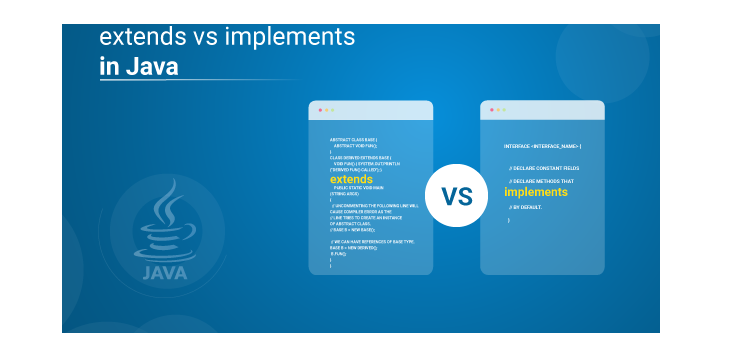Implements vs Extends
Implements and Extends are two keywords found in Java programming language that provides a means of transferring added functionality to a new class. Implements keyword is used explicitly for implementing an interface, while Extends keyword is used for inheriting from a (super) class. Please note that the concepts of inheritance and interfaces are present in most of the other object oriented programming languages like C# and VB.NET, but they offer different syntax or keywords for applying those concepts. This article only focuses on Implements and Extends keywords defined in Java.
Extends
Extends keyword is used to implement the concept of inheritance in Java programming language. Inheritance essentially provides code reuse by allowing extending properties and behavior of an existing class by a newly defined class. When a new subclass (or derived class) extends a super class (or parent class) that subclass will inherit all attributes and methods of the super class. The subclass can optionally override the behavior (provide new or extended functionality to methods) inherited from the parent class. A subclass cannot extend multiple super classes in Java. Therefore, you cannot use extends for multiple inheritance. In order to have multiple inheritance, you need to use interfaces as explained below.
Implements
Implements keyword in Java programming language is used for implementing an interface by a class. An interface in Java is an abstract type that is used to specify a contract that should be implemented by classes, which implement that interface. Usually an interface will only contain method signatures and constant declarations. Any interface that implements a particular interface should implement all methods defined in the interface, or should be declared as an abstract class. In Java, the type of an object reference can be defined as an interface type. But that object must either be null or should hold an object of a class, which implements that particular interface. Using Implements keyword in Java, you can implement multiple interfaces to a single class. An Interface cannot implement another interface. However an interface can extend a class.
Difference between Implements and Extends
Although, Implements and Extends are two keywords that provide a mechanism to inherit attributes and behavior to a class in Java programming language, they are used for two different purposes. Implements keyword is used for a class to implement a certain interface, while Extends keyword is used for a subclass to extend from a super class. When a class implements an interface, that class needs to implement all the methods defined in the interface, but when a subclass extends a super class, it may or may not override the methods included in the parent class. Finally, another key difference between Implements and Extends is that, a class can implement multiple interfaces but it can only extend from one super class in Java. In general, usage of Implements (interfaces) is considered more favorable compared to the usage of Extends (inheritance), for several reasons like higher flexibility and the ability to minimize coupling. Therefore in practice, programming to an interface is preferred over extending from base classes.
Source: differencebetween.com




0 comments:
Post a Comment